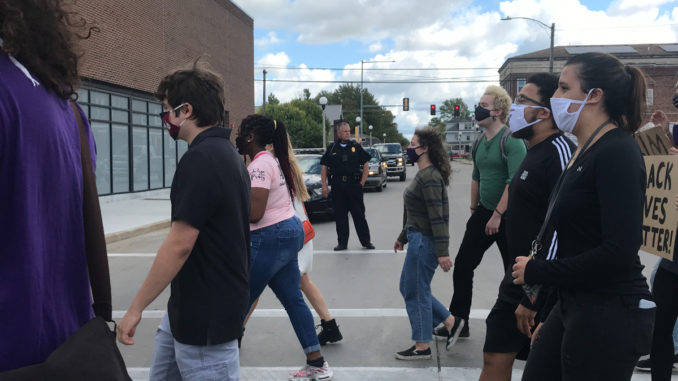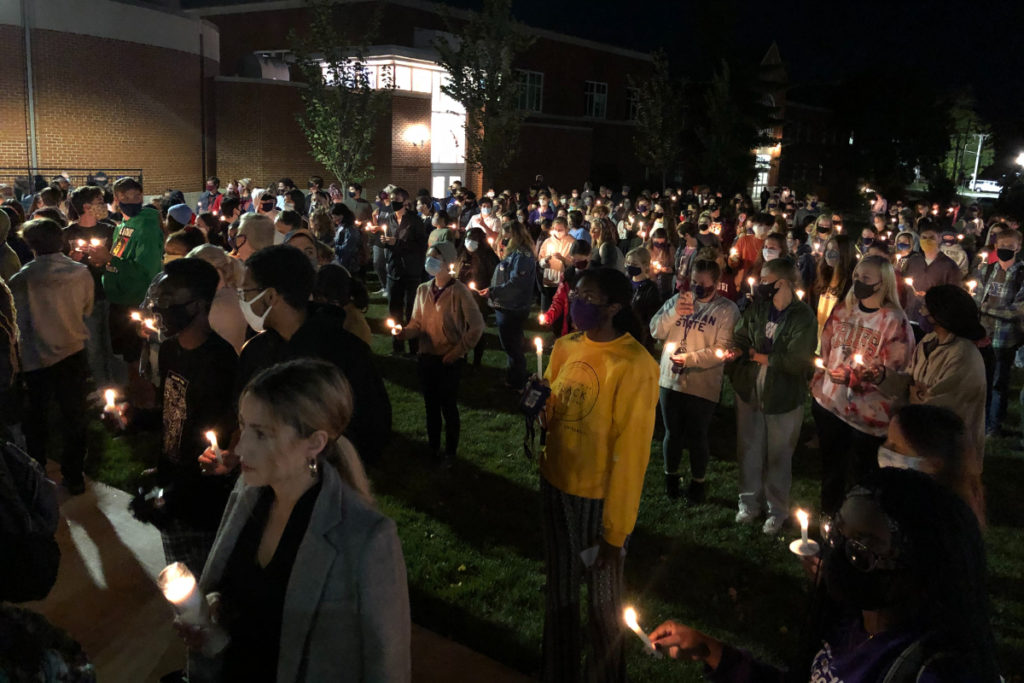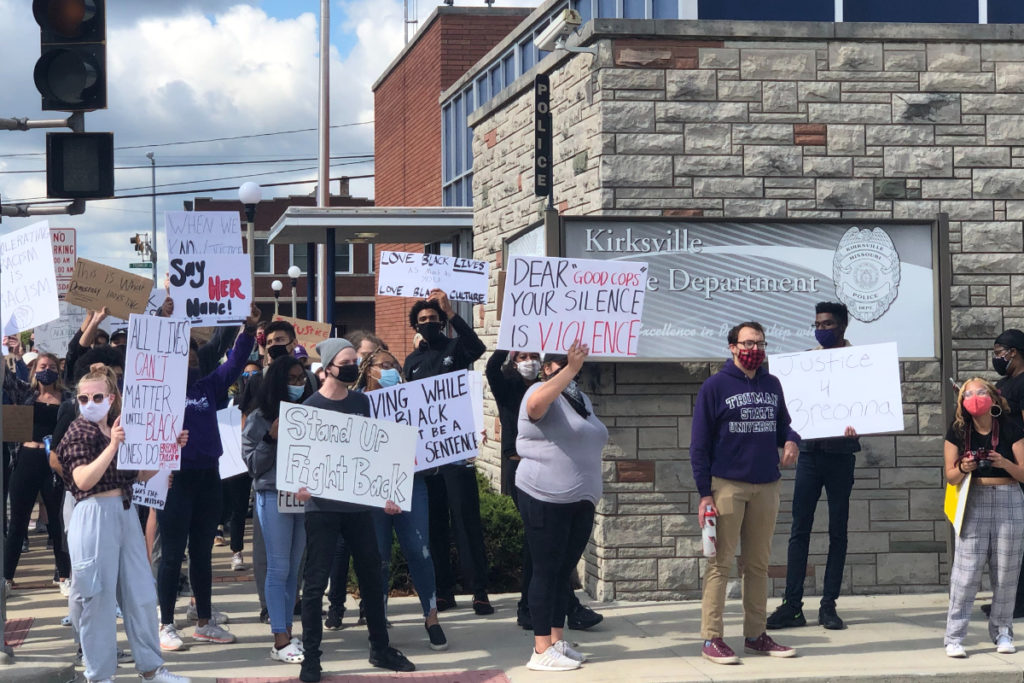
In response to growing scrutiny of law enforcement and calls for the Truman State University Department of Public Safety to be defunded, Director of Public Safety Sara Seifert started a new group called TruAlliance.
The group was created to facilitate communication between the Truman community and the Department of Public Safety. The group’s creation came after a march and candlelight vigil Sept. 28 protesting the killing of Breonna Taylor.
Both students and staff at Truman are a part of the group, with different offices and student groups being represented, including members of the Truman administration, the Kirksville Police Department and Student Government. TruAlliance meetings, which started Sept. 9, are held every other week via Zoom.

TruAlliance was created with the intent of “establishing proactive communication with student groups on campus, enhancing meaningful discussion about topics of importance to students, providing transparency about processes and procedures, and establishing avenues for proactive, rather than reactive change.”
Seifert explained that since there are about 7,500 people on campus between staff and students and only 10 law enforcement officers, it is imperative students and staff work together to open communication and build trust. She said campus policing is focused around community, so she wanted to help humanize the officers on campus and allow students to know the people behind the badges.
Seifert said one of the themes the group deals with is perception. She wanted to get the students’ perspectives so DPS could better serve and protect students.
In one meeting, Seifert said a student of color brought to her attention an encounter they had with an officer where he rested his hand on his gun. Seifert said, to her and other officers, it is a simple gesture they do without thinking about it. However, because the student vocalized their concerns, she was able to bring it to the attention of her officers for them to be as non-confrontational and non-threatening as possible.
Seifert was also able to address student concerns by visiting different student groups and explaining the DPS budget and hiring process. She has been making regular posts to different social media platforms in order to explain to students how and why different processes occur within the DPS.
Senior AJ Barnum, secretary for the Progressive Student Alliance, regularly attends TruAlliance meetings.
“I really wasn’t expecting much, but I figured why not try, and I think their whole goal with transparency was good, and something that we need more of, so I kind of just wanted to see where they were going to go with that,” Barnum said.
Barnum noted that recent police brutality has created apprehension toward police. Even though Barnum has been able to learn more about the officers themselves and the training they go through, it is not possible to know where the next shooting could be, and Barnum still thinks it could very well take place in Kirksville.
Barnum said during the meetings they discussed the fact that in the 1990s officers did not carry weapons, which changed with the rise of school shootings. While Barnum had not made any calls for police to be defunded, Barnum supported the deweaponization of officers and moving some funding from police officers to mental health professionals.
“Basically the response was just, we’re nice people, and we have training to deal with different situations … I understand where they’re coming from but it’s not enough,” Barnum said.
Though the meetings are informational, Barnum is not sure that the meetings have resulted in any actual change.
During a Nov. 4 meeting, there were nine total participants. The group discussed ways to increase attendance at TruAlliance meetings, ways to increase the number of incidents reported by students, student stress and mental health. Offensive signs recently found near Truman’s campus were also discussed.
Overall, meetings have been focused on communication between Truman administration and students, with Seifert asking for student feedback and suggestions.

“What I learn every time I’m in those meetings is, there’s a nuance to observation that I didn’t see, and for me it gives me [a] better perspective on things,” Lauri Millot, institutional compliance officer and regular TruAlliance attendee, said. “I think it just expands my perspective and my horizon on topics.”
TruAlliance has also been a platform for Millot to bring awareness about a new type of discrimination report implemented fall 2020 called the Bias-Related Incident Response. Millot said the report, which can be found at Truman’s Title IX, DPS and Center for Diversity and Inclusion websites, allows students to anonymously report any encounter that did not necessarily violate Truman policy but did demonstrate bias or discrimination.
This report is different from others in that it allows the student to report any kind of bias and is designed to allow students to confidentially report an incident without fear of retaliation. It requires less investigation than other reports but instead is a way to compile patterns of behavior at Truman of bias and discrimination, so the administration and students can be aware of the issues and work to address them. The number of bias-related incident response reports will be published.
“I think [the report is] a great way to identify issues early, and is a great educational tool … for those who think it’s not happening on campus, that will teach you that it is,” Millot said. “It will also give us the opportunity to see what’s happening and how to respond to it.”
Through TruAlliance, Millot said she’s been able to learn more about why students might not report issues. She said she already knew that sometimes students do not want to report an incident because it was too painful to relive or because they thought it was just something they were used to.
However, it was brought to her attention that sometimes students don’t report because they don’t think the administration would do anything about it. Millot explained that because the situations she works with are so confidential, students don’t often get to see how hard she works to address these issues.
Along with discussing the Bias-Related Incident Response, TruAlliance members have also been able to discuss issues on campus such as protesting safely. Students were able to ask questions to Kirksville City Manager Mari Macomber and Deputy Police Chief Justin Jones in order to learn more about city rules and regulations.
“I’m committed to hearing the students’ stories and concerns and to working with them to make Truman a safer place to live and learn,” Seifert said.
Barnum said more students should join TruAlliance to contribute different perspectives and bring about a more effective conversation.
While TruAlliance has mainly been by invitation only, Seifert said if students want to get involved, they can email her at sseifert@truman.edu.
If students would like to join TruAlliance meetings, they can request a zoom link at Center For Diversity & Inclusion.
